Hamish McLachlan: Swim champ Bronte Campbell proves she’s poetry in motion
THERE’s more to Commonwealth Games champion Bronte Campbell than swimming ... including a love of Rudyard Kipling, writes Hamish McLachlan.
News
Don't miss out on the headlines from News . Followed categories will be added to My News.
BRONTE Campbell was born in the small African country Malawi. Her mother, Jenny, used to buy bread for the homeless when grocery shopping and give it to those less fortunate on the way home. You feel that sensitivity and caring nature has rubbed off on all of her children. Bronte, the second of five kids, moved to Australia as a seven-year-old. She fell in love with swimming when she saw Grant Hackett win the 1500m at the Sydney Olympics. Extraordinarily, at one stage Bronte was the world champion in the 50m and 100m freestyle, but wasn’t always the quickest 100m swimmer in her family. She and sister Cate dominated the pool on the Gold Coast this month. Bronte and I spoke about playing the guitar, Rudyard Kipling, her love of family, her brother Hamish’s battle with cerebral palsy, her “best friend rivalry” with Cate, the ideal dinner party, and what life is looking like after swimming.
HM: Bronte, when you look back at the Games, what’s your instant reaction?
BC: I think for me it was just a Games that exceeded expectations in every aspect. As soon as I got to the village
it just exceeded what I thought it was going to be. It was a great village. The atmosphere was incredible, as were the crowds at the pool, and personally, my own friends were all there. It was amazing how the rest of the swim team performed, and the broader Australian team at that. Everything about it just ended up being a lot more than I thought it would be.
HM: Can some villages be no good?
BC: Um … yes! I think Rio was a fine example of that!
GIVE BRONTE CAMPBELL RELAY SWIM
CAMPBELL SISTERS TELL WHAT HAPPENED AFTER WOMEN’S 100M FINAL
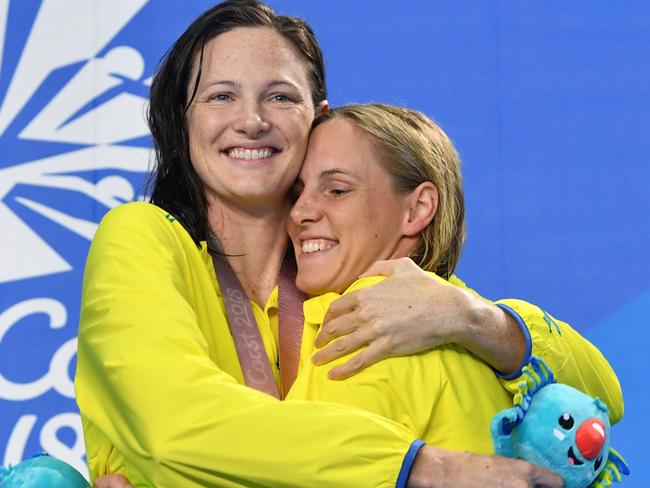
HM: Swimming in a moment. How’s the guitar playing going? What are you playing?
BC: (laughs) I’m not a good guitar player. I just decided to play it because, well, half because my boyfriend plays it and I got sick of not being able to play the guitars that were lying around, and half because I’ve always wanted to learn it. I can play Riptide.
HM: If you can play Vance Joy, you can start a party any time you like.
BC: Yeah, that’s probably right, but the issue is although I can play Riptide on the guitar, I can’t sing it too well. I need a chorus with me.
HM: Can Cate sing?
BC: Um, no. If you ask her, she might tell you she can, but the answer is no!
HM: You and Cate are household names, but there are three other siblings — Jessica, Abigail and Hamish. You’re all very close?
BC: We are. Family is everything to me. I’m very lucky with the family I have.
HM: They enjoy your success and they’re happy for you, but they’ll let you know when to pull your head in.
BC: Yeah, for sure. They’re not going to let us get ahead of ourselves. We go home and play darts, and I’ll get beaten by my 16-year-old sister. That’s why you want to go back and be with your family, because they’re the ones who will take a dig at you no matter what. There’s no place for someone with a big head in a family like ours. It’s rarely about Cate and I at home. All my other siblings live completely different lives to what Cate and I do, but that doesn’t make them any less valid lives. It’s nice to just go home and be normal. There’s no room for anything in our family other than complete normality.
HM: Your younger brother Hamish was poolside. Does he still think you’re funny?
BC: Funny … he thinks I’m hilarious! It doesn’t take much to make Hamish laugh if he’s in the right mood. I said hello to him by the side of the pool at the Games; he was right there on the side, and he’s aware that something’s going on. He definitely didn’t expect to hear my voice among everything else that was happening. That was really nice for both of us.
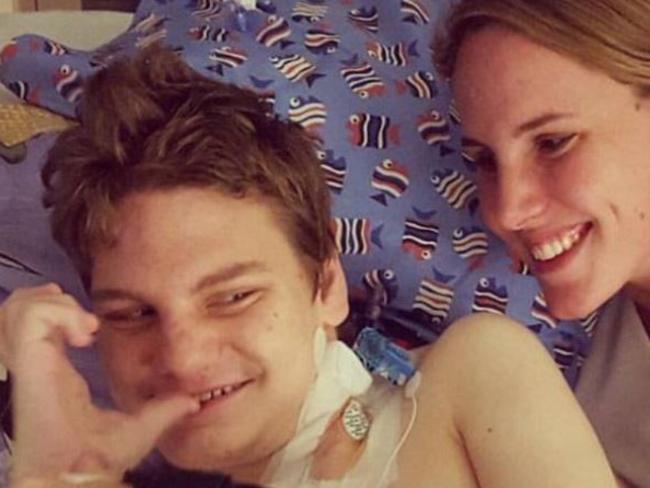
HM: How’s he coping now?
BC: Hamish has had a really good year. He’s been in palliative care for about a year and half. He had a bit of a rough year in 2016, and for half of 2017. This year he’s been coping really well. It was great for us all that he could even get out to the swimming, as it wasn’t looking like he could. He’s a full-time job for my mum to care for, but he’s on the improve, which we didn’t really think would happen, so that’s exciting.
HM: Your mum gave up nursing to care for Hamish when he was born?
BC: Yeah, Mum was a nurse before she had us kids, and then Hamish was obviously a big complication, not that she’s ever seen him like that! She was in South Africa as a nurse. Hilariously, now she’s back at uni, part time, doing midwifery while caring for Hamish.
HM: She sounds like an amazing woman.
BC: She is for sure. She wants to work as a nurse again at some point. It was a bit difficult to get requalified. It’s sort of easier to just go back to the start and do it again. She’s loving that. She told me today she got 87 per cent on her assignment, and she was very pleased about it.
HM: Sounds like she’s more on top of her uni than you …
BC: My mother is much more on top of everything than I am, but she’s a complete nerd, so of course she’s on top of her uni!
HM: Rudyard Kipling. If —. Is Rudyard still your man?
BC: He’s not on my wall anymore, because I’ve moved house, but I remain a huge fan.
HM: When I was having a tough time a while ago, someone gave me a copy of If — by Kipling. He kept it in his glovebox. We were at a lunch, and he went out to his car, brought it back and told me to keep it with me. I’ve had it close by ever since. What’s the line or two that most resonates with you?
BC: “If you can meet with triumph and disaster, and treat those two impostors just the same.” That’s probably the best one. It’s so applicable to everything, not just in my swimming life, but in everything. “If you can dream and not make dreams your master.” The whole poem is good!
HM: Every line is crafted so beautifully.
BC: Every line is amazing and has such significance.
I love it.
HM: “If you can keep your head when all about you are losing theirs and blaming you. If you can trust yourself when all men doubt you …”
BC: “But make allowance for their doubting too …” We all need to do that. Lots of doubters that can unnerve you.
I had that on my wall for ages written above my desk, but now I know it off by heart. Every line means so much to me.
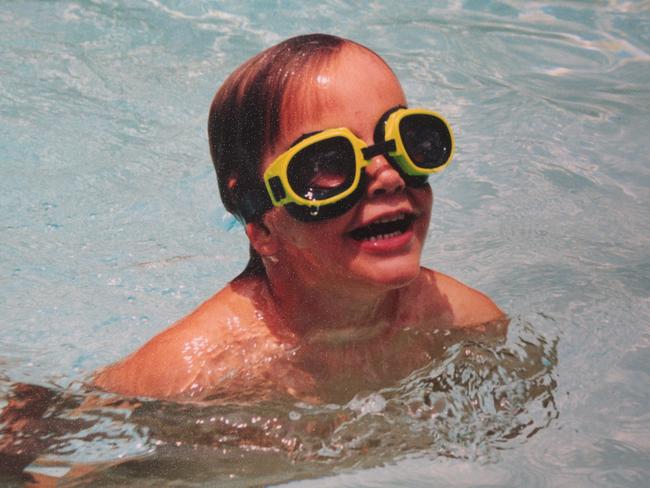
HM: You write a lot of poetry, too — and read it to the swim team?
BC: Yeah, that started in 2013 when Cate forced me into sharing one of my poems with the team. Now I do it every year at our last meeting before we head into competition. I’m writing anyway, so the team may as well get to hear it, and I think it resonates with some of them.
HM: How were you able to you swim so fast on the Gold Coast? What was different?
BC: I don’t know exactly. I’ve been injured now for two years, and in that first year I was really trying to find a different way of doing things. It was really rough, because the way I’d been training before wasn’t possible anymore, and I had to find a different way to be fast, and a different way to get that strength, without being able
to do what I knew made me fast.
HM: Is it the shoulder?
BC: It’s mainly my left shoulder, my neck and my right hip. They are the main ones.
HM: Cate had a sabbatical after Rio, and there were some murmurings that you might have one post the Gold Coast to get the body better. Are you going to do that?
BC: Yep, it’s locked in. I’ll have three months off at least. I decided in November last year that it was 100 per cent happening. I went through a bit of a bad spot with all the injuries in November, so I thought well, OK, let’s just try push through to the Comm Games; let’s get that done. I don’t want to miss that, let’s try get to that first. If we can just get them a little bit more under control, then I feel like I can do two more years, and go all the way through to Tokyo.
HM: Is the break purely physical, or do you think you’ll reset mentally as well?
BC: Yeah, I think it will be good for both. It wasn’t what motivated me to do it, but now that I’m looking down the barrel of it, it’s pretty exciting for me.
HM: Can we talk about the anchor leg in the medley, and the 100 free win?
BC: Everything just came together on the night of the 100m. Sometimes you just have a blinding swim, and I didn’t expect that to happen, but it happened. The 100 win came out of nowhere.
I wasn’t incredibly fast in the warm-up, but I just stayed relaxed in the first 50m and then had a lot more left to give than what I thought I did. I was incredibly surprised and incredibly excited. I hadn’t been anywhere near my best times for close to three years, and then
I went 0.3 seconds faster than that. To post a world-class time again after a few years of really struggling, and feeling like everyone else was swimming quickly, catching me, and getting faster than me, was really rewarding. I think that’s why I was so happy afterwards; it was more than just having a number one next to my name! It was a bunch
of things that made it really special.
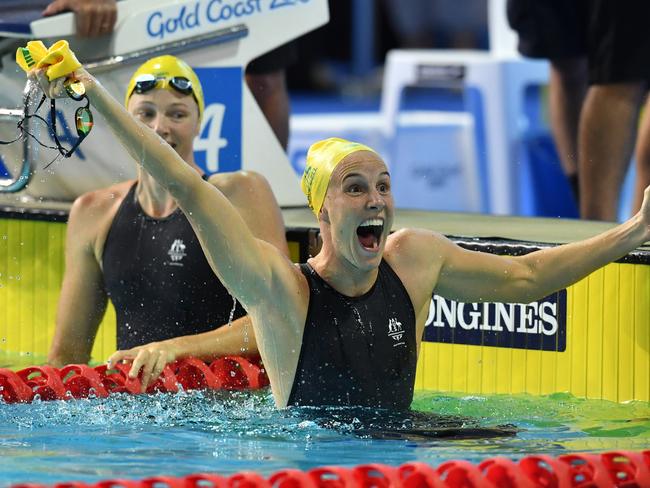
HM: The sibling relationship is fascinating. When I look at Venus and Serena I always find it a complicated match-up. They’re the best of friends, and they’re trying to defeat each other in front of the world. How do you manage that on the blocks?
BC: From when we were little kids, Cate and I both wanted to do the swimming thing together. It was a dream that both of us shared. When you’re growing up in age group swimming, you’re not competing against each other. Then when you qualify for the team you’re just happy that the other person is there, but on the world stage it’s like, Australia against the rest of the world! If you don’t do well, or if someone else beats you, wouldn’t you want that person to be someone that you have shared the entire journey with, rather than some random person who you don’t really care about?
HM: Once you are on the blocks, is swimming against Cate just the same as swimming against a Canadian or an American?
BC: Pretty much. From the outside it looks like a very difficult thing to manage, and it is difficult when something like 100m freestyle comes around. Cate would have really liked to win that race, but she was just happy that I had a good swim for myself. She’s genuinely stoked that I swam fast. She would have been more stoked if I’d swum that fast and she’d swum faster and won, but she was still really happy for me.
HM: The Campbell sisters had a pretty extraordinary Games together: 50m free quinella, Cate from Bronte; 100m free — quinella, Bronte from Cate; 4x100m gold, together. Do you get as much joy out of it as the rest of Australia?
BC: (laughs) Yeah, we do, we get a huge kick out of it! It is as good as it gets. Being in the relay together is always incredible. We broke the world record together, representing Australia, at a home Games. It still feels amazing.
HM: What happens after Tokyo? Are you still keen on PR and comms?
BC: Yeah, I’m studying business and majoring in PR. After Tokyo, I’m not quite sure. I’m working towards getting my uni done by 2020. That’s one of my little goals now. More presently, I’m working towards getting an assignment done by when it’s due — this Wednesday — and I haven’t started yet!
HM: It sounds eerily familiar. I’ll be as quick as I can!
BC: Does “I’ve been swimming” hold as an excuse? I enjoy studying, though. There’s aspects of it that really appeal to me, and during this time off now I’ll do some interning in a few areas, in PR and media. I’ll see what that has to offer. There’s not really much of an opportunity to do that while we’re training. Hopefully something involved in sport. I love what it does for people and I love the people who are involved in it, so hopefully something around there.
HM: You were born in Malawi — one of the highlights of the Games was seeing Malawi’s celebrations after they beat New Zealand. Did you see that?
BC: Yeah, Cate and I both saw the celebrations. I think that was the night of my 100m semi-final. The team physio told me and showed it to me, and I was just so happy for them. It’s fantastic to see a country celebrating something, and it was great to see a country so happy. It just meant so much to them. Sports wins don’t have to come in the form of a medal. A surprising win, or sometimes just finishing, can produce great moments. Their celebration was the most over the top, fantastic celebration of the win, sport, their country and themselves. They need to teach me those dance moves though, because
I can’t dance.
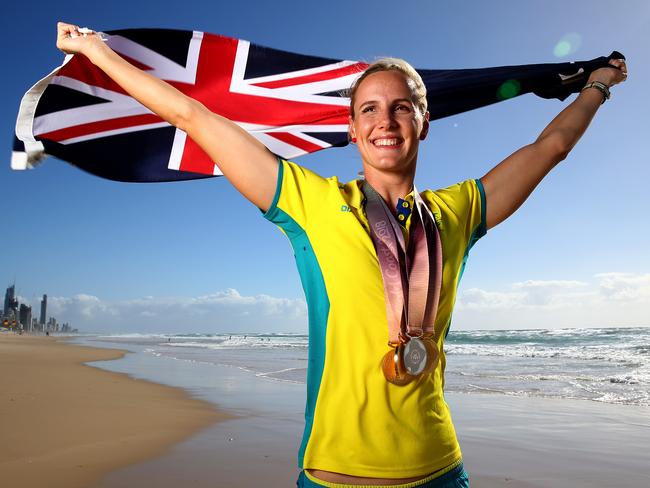
HM: You can’t dance or sing?
BC: But I can swim and recite Kipling … not sure where that leaves me, though!
HM: In good shape. What book should I be reading?
BC: I read Seven Types of Ambiguity, which is now a TV show on the ABC.
It was a very interesting book.
I thought it was an interesting way of looking at different people, and how a different perspective can bring a whole new meaning to a story. The books I read every single year are The Great Gatsby, and Pride and Prejudice.
HM: I was told today to read Something for the Pain by Gerald Murnane. The fella that recommended it is a very good judge, for what it’s worth.
BC: Something for the Pain, all right.
I’ll put that on the list.
HM: Six people for dinner, Saturday night, at a venue of your choice. Who are you dining with?
BC: Definitely Nelson Mandela. He would be No. 1 on my list, and I don’t need to explain why! Then I’d put someone on who’s pretty funny, so I’d have Kitty Flanagan there. I think she’d lighten it up a little bit. I think I’d like Oprah there, and
I’d be secretly hoping she would say, “You get a car, you get a car!”, at the end of it.
I’d probably want Federer to be there.
HM: He might just be the coolest man on the planet.
BC: He is so cool. It’s a toss-up between Federer and Nadal there,
but Federer is probably the one.
HM: Have them both! A leftie and a rightie.
BC: All right, I’ll have them both.
HM: So you’ve got Nelson, Kitty, Oprah, Fed and Rafa. You’ve got one more. Your boyfriend’s stiff at this point …
BC: Yeah, maybe I should bring my boyfriend.
HM: Maybe not with Roger and Rafa there.
BC: (laughs) I think they’re both taken actually! Maybe I’ll bring Benfield along. I think he’d enjoy it.
HM: Benfield is his first name?
BC: Yeah, it’s bizarre. Benfield Lainchbury. It’s very interesting. It’s the same conversation every time. “Benfield …” “Oh, so Ben?” “No. Benfield.” “Ohhh.” I should call him Ben, but I don’t. It’s English, it was his dad’s middle name. I think it was his dad’s family name from way back.
He’s pretty much everyone’s first Benfield. I don’t think anyone else is called Benfield, are they?
HM: Not that I know of. Bronte, congratulations on a terrific Commonwealth Games campaign.
BC: Any time. Thanks, Hame.


